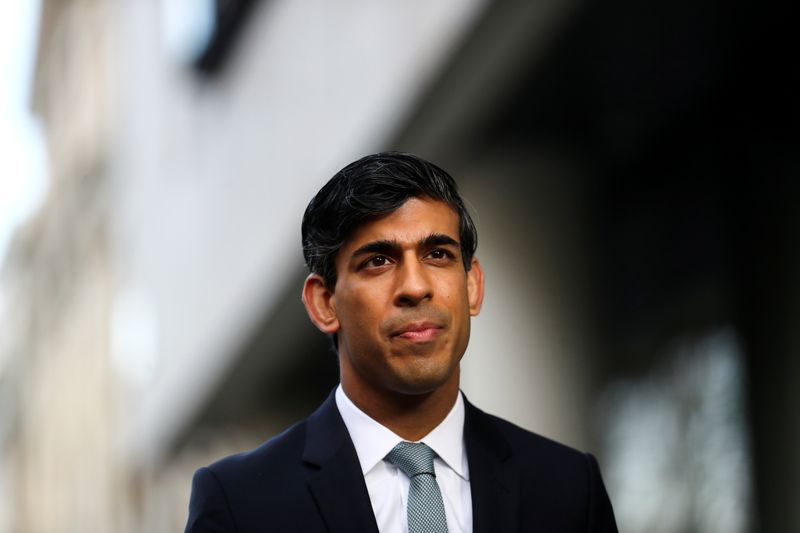By William Schomberg and Paul Sandle
LONDON (Reuters) - British finance minister Rishi Sunak said there would be no return to austerity in a spending plan he will announce on Wednesday, even as the coronavirus crisis pushes Britain's debt further above 2 trillion pounds.
Sunak, who has rushed out massive government spending increases and tax cuts equating to about 10% of economic output, said he would announce "quite a significant" increase in funding for public services.
"You will not see austerity next week," Sunak told Sky News on Sunday, saying his priority in the one-year spending plan was to fight the health and economic crises.
More than 3 billion pounds will be set aside in extra help for the health service.
Sunak is also expected to commit to existing pledges to increase spending on police, nurses and schools, the Treasury (finance ministry) said.
Economists think Britain will borrow about 400 billion pounds this year, approaching 20% of gross domestic product, the most since World War Two.
It would be nearly double the hit from the global financial crisis, which took a decade to work down, and some lawmakers in Prime Minister Boris Johnson's Conservative Party want more fiscal restraint now.
Sunak said forecasts to be published on Wednesday would show the "enormous strain" on the economy and now was not the time to cut back on spending or raise taxes.
"Once we get through this crisis we need to think more about returning to a more normal path," he told Times Radio.
In an interview with the Sunday Times, Sunak said he hoped that, by the spring, with progress on vaccines and testing for COVID-19, he would be able to "look forward" to the job of tackling the public finances.
Though yields on government debt remain close to record lows, Sunak is expected to announce on Wednesday a freeze on public sector pay to offset some of his spending.
"When we think about public pay settlements, I think it would be entirely reasonable to think about those in the context of the wider economic climate," he said.
Sunak also said he would announce longer-term measures to boost infrastructure spending, part of Johnson's promise to spread economic growth to regions that lag behind London and the southeast.
Capital investment that will be confirmed includes 3.7 billion pounds for 40 hospitals, 1.5 billion pounds for further education colleges and schools, and 4 billion pounds for more than 18,000 additional prison places in England and Wales over the next four years, the finance ministry said.
Britain also faces the risk of an economic shock if it fails to strike a trade deal with the European Union in time for the Dec. 31 expiry of its post-Brexit transition.
Sunak said the government wanted to get a deal but the short-term impact of not doing so would pale by comparison with the hit from the COVID-19 pandemic.

(This story has been refiled to restore dropped word in first paragraph)